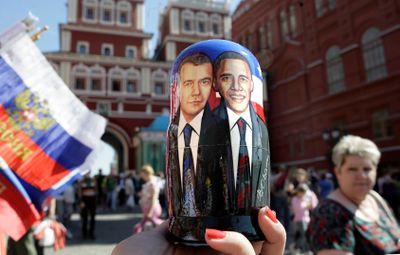Russia stop will test Obama’s diplomacy
Defense systems and Iran top issues for Moscow talks

WASHINGTON – President Barack Obama is scheduled to leave Washington tonight on a weeklong trip that will help determine whether his personal popularity and fresh policy approaches can yield concrete results on difficult issues including arms control, missile defense and nuclear nonproliferation.
After seeking support for U.S. policies from allies in Europe and appealing for a new relationship with the Muslim world in Cairo on previous trips, Obama arrives in Moscow on Monday for his first foray into high-profile, nuts-and-bolts negotiations with the leader of a nation that might be deemed an unfriendly rival.
Shortly after taking office, the Obama administration made clear that it wants to “reset” relations between the United States and Russia, which deteriorated under President George W. Bush. During Obama’s first meeting with Russian President Dmitry Medvedev, in London in April, the two agreed to a broad statement of cooperation on numerous issues.
Both the White House and the Kremlin hope to build on that with a summit in Moscow, and agreements on subjects including Afghanistan and nuclear proliferation are expected to be unveiled. But fundamental differences remain on key issues that have strained U.S.-Russian relations.
Medvedev wants U.S. pledges to scrap a missile defense system in Eastern Europe and to rule out military alliances with the former Soviet republics of Georgia and Ukraine. Obama wants Russia to back tough sanctions against Iran if diplomatic efforts to curb its nuclear program fail. Neither president has indicated any willingness to yield.
“We’re not going to reassure or give or trade anything with the Russians regarding NATO expansion or missile defense,” said Michael McFaul, special assistant to the president and senior director for Russian and Eurasian affairs. “We’re going to define our national interests, and by that I also mean the interests of our allies in Europe with reference to these two particular questions.”
Sergei Prikhodko, Medvedev’s chief foreign policy adviser, struck a similar tone. “Saying that it will be easy to move forward would mean deluding ourselves,” he told reporters. “The domestic agendas of both leaders and their agendas in dealings with allies do not always coincide. Sometimes, they contradict each other directly or indirectly.”
Obama is scheduled to meet on Tuesday with Prime Minister Vladimir Putin, whom analysts called the pre-eminent power in Russian politics. Obama told the Associated Press last week that the former Russian president must move beyond a Cold War approach to relations with the U.S.
The willingness of Obama and Medvedev to compromise will be tested when they discuss a treaty to replace the landmark START I nuclear arms control pact, which expires in December.